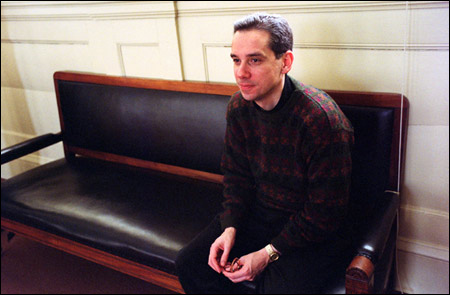Basic research takes root, flowers :
Bringing new methods to the social sciences

A center for social science research has been quietly growing on the Harvard campus for five years, fostering interdisciplinary thought and coming up with new ways to conduct social science research on topics such as the causes of war and removing bias from social science surveys.
“Basic research furthers knowledge about human behavior but it also sets the stage for the application of that knowledge to solving social problems,” said Lee McIntyre, associate director of the Center for Basic Research in the Social Sciences (CBRSS). “CBRSS’s mission is to change the nature of social science research.”
The center, begun in 1998 and the first dedicated to basic research in the social sciences, is directed by Frank G. Thomson Professor of Government James Alt. Through the work of many associated faculty, as well as staff, research assistants, and other affiliates, the center is working to improve statistical methods, formal modeling, and other quantitative tools that can be used in social science research.
“We don’t pick out a particular policy question to work on,” McIntyre said. “We come at it from the other end. We do basic science that can then be applied to a number of problems.”
The center seeks to cut across the traditional boundaries of academic disciplines and may already be responsible for one of the most interdisciplinary exercises on campus, according to David Florence Professor of Government Gary King, a member of the CBRSS steering committee. He said the center has begun a seminar on applied statistics, billed as “a tour of Harvard’s statistical innovations and applications with weekly stops in different disciplines.”
One week, King said, political scientists talked about using statistics to study how many vetoes the president casts in a year. Another week, he said, astrophysicists talked about analyzing data from the Chandra X-Ray observatory. Though the two applications were very different, King said the audience realized that the data, represented by counts of vetoes in one case and counts of photons hitting a detector in the telescope in another, were similar.
“The political scientists didn’t know some of the Bayesian methods the astrophysicists were using and the astrophysicists didn’t know about some of the statistical problems with these data that the political scientists had uncovered,” King said. “That [seminar] may be the single place at Harvard where the most interdisciplinary connections are regularly created.”
Besides creating connections around quantitative methods, the center’s research has also found application in useful settings. King and a colleague have pioneered a way of looking at rare events that could help predict and avoid such things as the outbreak of war.
Consistent with the interdisciplinary nature of the center, King’s rare events research has applications in other fields too. It has been used by physicians to study medicine’s own rare events, such as brain tumors and other diseases.
King and his colleagues at Harvard and elsewhere have solved a problem that has plagued social science survey research: how to eliminate different interpretations of questions by those taking the surveys. Those different interpretations cause problems because they color the respondents’ answers and make the data difficult to compare across cultural and regional boundaries.
King and his colleagues have come up with a new way of asking questions combined with a new statistical method that can be used to correct for these common biases. Their ideas have been adopted for numerous surveys all over the world by scholars in many disciplines – from political scientists studying how much input citizens of different nations have in their government, to researchers measuring the health of national populations, to education researchers seeking evaluations of public schools.
New associate director
After five years of focusing mainly on its research, the center is growing and becoming better known. McIntyre was hired in January to serve as associate director in order to manage this growth, handle communications, and lead fundraising efforts. McIntyre, a former assistant philosophy professor at Colgate University, has been special assistant to the Faculty of Arts and Sciences Executive Dean Nancy Maull and is currently transitioning to his new post at CBRSS.
“We need to have a science of human behavior,” McIntyre said. “We need to understand why people do what they do. Then we can make a better society.”
McIntyre said the center is one of the “best kept secrets at Harvard.” With the research well under way, McIntyre said the natural next step is to raise the center’s profile so policy makers and social scientists who could benefit from its research hear about it.
McIntyre himself said he was surprised when he first heard about the center, because its thrust so closely mirrored his own academic work and his 1996 book “Laws and Explanation in the Social Sciences: Defending a Science of Human Behavior.”
“I wanted to start a think tank on this very subject,” McIntyre said. “They saved me a lot of trouble.”




